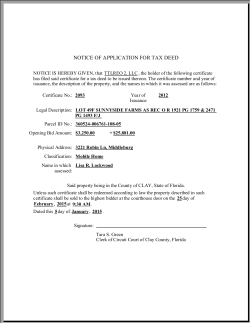
Dare Student Flyer PDF
An admissions scheme for school leavers facing social and economic challenges in accessing college. INFORMATION LEAFLET www.accesscollege.ie www.facebook.com/accesscollege twitter.com/accesscollegeie FOR ENTRY AUTUMN 2015 HEARTION CA ICS I L P P A E CLIN ADVICwide Saturd1a5y Nationary 10th 2e0.ie Janu ww.accesscnodllteimg es a See wocations l r o f W hat is the Higher Education Access Route (HEAR)? The Higher Education Access Route (HEAR) is a college and university admissions scheme which offers places on reduced points and extra college support to school leavers from socioeconomically disadvantaged backgrounds who have completed an Irish Leaving Certificate. HEAR has been set up by a number of colleges and universities as evidence shows that longterm poverty can have a negative effect on how well a student does at school and whether they go on to college. W hat are the benefits of filling in a HEAR Application? Reduced Points Places: Each participating college has a reserved number of places to offer eligible HEAR students at lower Leaving Certificate points. Extra College Support: If you get a place through HEAR you will receive a variety of academic, personal and social supports while at college. Examples of extra college supports may include: One to one meetings with student advisors. An Orientation Programme to introduce you to college life. Social gatherings/mentoring. Extra tuition if required, study skills, exam preparation. Extra financial assistance when available/ advice regarding grants and scholarships. What HEAR is not HEAR is not your maintenance grant. The maintenance grant is the main source of financial assistance available from the Irish State for students in full-time Post Leaving Certificate Courses (PLCs) and full-time higher education undergraduate courses. If you apply to HEAR you should also apply to Student Universal Support Ireland (SUSI) for your higher education maintenance grant if you think you may be eligible. See www.susi.ie for further details. Who can apply to HEAR? HEAR is for school leavers under the age of 23 as of 1 January, 2015 who have completed an Irish Leaving Certificate. HEAR applicants must meet a range of financial, social and cultural indicators to be considered for a reduced points place and extra college support. How do I fill in a HEAR application? An application to HEAR is made up of 3 parts: 1.Apply online to CAO by 17:15 on 1 February 2015 (CAO applications open on 5 November 2014 at 12 noon). 2.No later than 17:15 on 1 March 2015, you must indicate in your CAO application that you wish to apply for HEAR and you must fully and correctly complete all elements of the HEAR online form (the HEAR form is a part of your CAO application). 3.Submit relevant evidence in support of your application to arrive at CAO no later than 17:15 on 1 April 2015. To complete your online HEAR Application you must: Get assistance from your parent(s)/ guardian(s). Use the HEAR Application Guide and Workbook to help you answer all relevant questions on your online HEAR application. You can download the HEAR Application Guide and Workbook at www.accesscollege.ie. Should I apply? HEAR applicants must meet a range of financial, social and cultural indicators to be considered for a reduced points place and extra college support. Here is a list of all the HEAR indicators: 1. Income: Your family income falls on or below the HEAR Income Limit. 2. edical/GP Visit Card: Your family has a Medical Card/GP Visit Card that was in date on M 31 December 2014. 3.Means Tested Social Welfare: Your family received a means-tested payment from the Department of Social Protection for at least 26 weeks in 2013. 4. ocio-economic Group: You belong to a group that is under-represented in higher education based S on the occupation and employment status of your parent(s) or guardian(s). The under-represented groups are the Non-manual Workers Group and the Semi and Unskilled Manual Workers Group. 5.DEIS School Attendance: You completed five years in a second level school that takes part in the Delivering Equality of Opportunity in Schools (DEIS) scheme run by the Department of Education and Skills. 6. rea Profile: You live in an area where there is concentrated disadvantage – in other words A an area where, for example, there is high unemployment and poverty and where only a small proportion of adults have attained third level education. You must meet Indicator 1, (the HEAR Income Limit), plus a correct combination of 2 other indicators to be eligible for HEAR. The combinations are: INDICATOR INDICATOR INDICATOR INDICATOR 1 plus 2 plus 4 or 5 or 6 1 plus 3 plus 4 or 5 or 6 1 plus 4 plus 5 or 6 1 plus 5 plus 6 Indicator 1, the HEAR Income Limit, is calculated by: How many children there are in your family. How many people in your family are in full time education. You can use the table to estimate if your family’s income is less than the HEAR Income Limit. Number of dependent children* in your family HEAR Income Limit Less than 4 €45,790 4-7 €50,325 More than 8 €54,630 Add €4,670 to the total income for every sibling/parent enrolled in a full time college, university or post leaving certificate course. * A dependent child is a child under the age of 16 years on the 1 October 2014 or a child or parent over 16 years and attending a full time course or medically certified as permanently unfit for work. Where can I find more information on HEAR? Full details of HEAR can be found on www.accesscollege.ie Higher Education Institution Website Email www.dcu.ie/students/access hear@dcu.ie www.dit.ie/ace hear@dit.ie www.nuigalway.ie/access hear@nuigalway.ie Maynooth University www.maynoothuniversity.ie/access-office hear@nuim.ie Trinity College Dublin www.tcd.ie/trinity_access hear@tcd.ie www.ucc.ie/uccplus hear@ucc.ie www.ucd.ie/openingworlds hear@ucd.ie www.ul.ie/access hear@ul.ie www.cice.ie info@cice.ie www.mie.ie/access hear@mie.ie www.mic.ul.ie hear@mic.ul.ie Dublin City University (incorporating St. Patrick’s College, Drumcondra and Mater Dei Institute of Education) * Dublin Institute of Technology NUI Galway University College Cork University College Dublin University of Limerick Church of Ireland College of Education Marino Institute of Education Mary Immaculate College, Limerick National College of Ireland Pontifical University, Maynooth www.ncirl.ie hear@ncirl.ie www.maynoothuniversity.ie/access-office www.maynoothcollege.ie/ pontifical-university hear@nuim.ie www.rcsi.ie/admissions_access hear@rcsi.ie www.stangelas.nuigalway.ie hear@stangelas.nuigalway.ie Royal College of Surgeons in Ireland St Angela’s College, Sligo Note * All first year students entering St Patrick’s College, Drumcondra and Mater Dei Institute of Education in September 2015 will register as DCU students. This is because St Patrick’s College, together with Mater Dei Institute of Education will become part of Dublin City University (DCU) from 2016. The process to bring the institutions together has already commenced. CAO Helpdesk Email CAO by clicking Contact Us at www.cao.ie 091 509800 www.cao.ie HEAR Timeline From November 2014 Fill in the HEAR Application Workbook with your parent(s)/guardian(s). Make a CAO application at www.cao.ie. Fill in the online HEAR Application at www.cao.ie. Gather your supporting documents. They can take more than 8 weeks to issue. By 1 February 2015 Apply to CAO by 17:15. By 1 March 2015 By 1 April 2015 Complete all elements of the online HEAR Application Form by 17:15. Gather all supporting documents relevant to your application. Submit copies of supporting documents to CAO, Tower House, Eglinton Street, Galway by 17:15. Put your name, CAO number, and PPS number on all documents. April – June 2015 HEAR Application Screening. In Late June 2015 Applicants notified of outcome of HEAR Application. End June/ Early July 2015 HEAR Application Recheck. August 2015 Leaving Certificate exam results. HEAR offers made by CAO. Accept CAO offer. Accept HEAR offer of extra college supports. Attend mandatory HEAR orientation programme.
© Copyright 2025

















